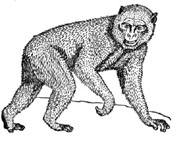
Darwinism, Dawkinism & Christian Accommodationism
GOD PROPOSES, SCIENCE DISPOSES?
At a large public university a group of Christian faculty has sponsored lectures by a visiting scientist. The scientist’s lectures call into question the Darwinian theory of evolution. The audience, mainly scientists, raises objections to his arguments, but the objections are not scientific and technical. They sound like objections any layman might raise. Later one of these scientists, an evangelical Protestant, scolds the Christian group for sponsoring the lectures. Such attacks on Darwinism, he maintains, are evidence of insecure religious faith, for a faith that tries to bolster itself by meddling in science is weak, even decadent. He advises that religion should look on silently while science goes about its business.
It’s not an imaginary scene. It happened at the University of Georgia, where I teach. And it raises a crucial question: What is the responsibility of religion to science?
The visitor was Professor Michael Behe, who spoke about intelligent design, a new scientific challenge to the standard Darwinian model of evolution. Contrary to a popular stereotype of those critical of the Darwinian paradigm, Behe is not a Christian fundamentalist and a nonscientist, but a professor of biochemistry at Lehigh University in Pennsylvania and a Roman Catholic. In his book Darwin’s Black Box: The Biochemical Challenge to Evolution, Behe acknowledges that he had accepted the standard evolutionary arguments for most of his life. This was not because he had lived the kind of schizophrenic existence of which religious scientists are sometimes accused — he did not “leave his brain at the church door.” It was because he adopted the practice — fairly normal for Catholics — of giving wide latitude to accepted scientific arguments that on their face might seem to contradict certain teachings of the Bible.
Behe’s shift in recent years to a moderately anti-evolutionary position was inspired not by any religious motive but by the scientific evidence. Obeying the scientific commandment “to follow the evidence wherever it leads,” Behe has come to the conclusion that living things were designed by some intelligent agent. The centerpiece of his argument is the evidence of “irreducible complexity,” the apparent impossibility that the complex organic machines revealed by modern biochemistry could have arisen through gradualistic evolution.
You May Also Enjoy
How refreshing it is to hear two atheist scientists call Darwin’s pet theory “utterly implausible, empty, and internally, fatally and irredeemably flawed.”
Review of The Trademark of God by George L. Murphy, Philosophy of Science by Del Ratzsch, and Cross-currents by Colin A. Russell
Prum's study advances the claim that much extraordinary avian morphology and behavior is best explained as a factor of female desire and mate selection.

